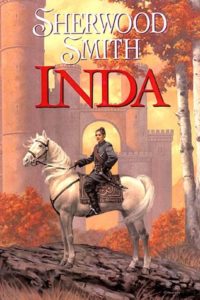
Back in 2019, after discovering the stunning works of Carol Berg, I began to hunt for female-authored epic fantasy that had flown under the radar in the 90s and 00s. And despite it being overshadowed by other popular mid-2000s fantasy [grumbles at marketing dollars thrown at The Name of the Wind instead], one series I saw recommended constantly was the Inda quartet by Sherwood Smith. Though completed and weighing in at only four books in length, it still took me some time to work through the quartet of 700-page doorstoppers. But nearly three years later, I’m immensely glad that I did.
Though Inda was written before A Song of Ice and Fire really blew up in the popular consciousness, the setup certainly calls to mind A Game of Thrones. A boy from a noble family—both in the sense of title and the sense of goodness—journeys to the capital where his father’s friend rules as king and his sister is promised to be married to one of the king’s sons. But not everyone in the royal family has good intentions, and the journey throws the lead into the midst of schemes and intrigue far beyond his understanding. It’s not a perfect match, but there are certainly echoes. Throw in a fairly grim, seemingly low-magic world and a mysterious threat lurking abroad, and the parallels are even stronger.
But Inda is very much not A Game of Thrones, and the quartet is not A Song of Ice and Fire. Both writers use similar raw materials, but with wildly different aims. And so it’s a series that scratches so many of the itches of late 00s and early 10s fantasy fandom–perhaps in lesser demand in the 20s, but still there–without being in the least bit grimdark. People die, injuries linger for years, political conflicts exist with no faction clearly in the right. And yet it’s clear that the world can be better, and those working for good are not painted as painfully naive. The result is a series I heartily recommend to those who enjoy large casts and grim, low-magic worlds, but who prefer fighting to make that world better over reveling in its depravity.
Now I admit that the size of the cast is a barrier to entry. Though Indevan “Inda” Algara-Vayir may have a nickname that’s easy to remember, he’s thrown into a military academy with a dizzying list of sons from various noble houses, all with their own first names, nicknames, house names, and titles. How long did it take me to notice that references to an “Evred Montrei-Vayir” were just talking about Sponge? It was a minute, that’s for sure. But Smith does a good job reminding the reader why they should know a particular name—and even lampshades the confusion later in the series, with characters in-universe forgetting a companion’s given name—and readers willing to work through the initial confusion will be rewarded with an absolutely charming cast that makes every new book feel like a warm hug, even while war and death threaten at every turn.
As to the overarching series plot, I won’t say much. But Inda captures the best elements of an academy story, and then follows the academy cohort years into the future, as they grow into those positions of power that they’ve been groomed for. And along the way, it tells tales of war, piracy, and general political intrigue. If there’s a weakness beyond the barrier of entry, it’s that the villains can be a bit one-note. They’re after power, or driven by paranoia or covetousness, and there isn’t much more to them. But goodness, on the other hand, is not so simple, and the heroes are delightfully complex. It’s their relationships, as they navigate conflicts between their own desires, their responsibilities to their friends, and their duties as leaders, that make the series an absolute joy to read.
While told in four books, the quartet has much more the feel of a trilogy with a double-length opener. While Inda is far from a slow-starter and packs plenty of action into its 700 pages, it ends on a cliffhanger and doesn’t feel complete without the sequel, The Fox. After that, the last two books truly have distinct arcs. It’s a series, and the story isn’t complete until the fourth book is done, but you can finish the second or third books with a reasonable sense of closure, even knowing more is to come.
Overall, whether you come for the intrigue, come for the academy, or come for the pirates, you’ll stay for the power of the main cast and the fantastic relationships between them. There’s plenty of action, with betrayals, terrifying enemies, and some excellent battles, and there’s some fascinating exploration of some elements I don’t often see in epic fantasy—including an unusually (perhaps unrealistically, to my eyes) sex-positive world totally free from sexual violence and a main character whose nation is perceived by outsiders as nothing more than uncivilized warmongers. But while all of that makes the series well worth reading, it’s the characters that make it unforgettable.
Recommended if you like: military academies, pirates, large casts, good-hearted characters trying to change the world.
Can I use it for Bingo? It’s hard mode for LGBTQIA List, Mental Health, Family Matters, it is a Book Club book, the first two have a Name in the Title, and the last two have No Ifs Ands Or Buts.
Overall rating: for each individual book, 18 of Tar Vol’s 20, five stars on Goodreads. For the quartet as a whole? I have to go with 19/20.
